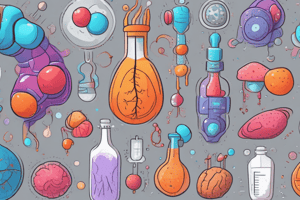Podcast
Questions and Answers
Which of the following is the best definition of metabolism?
Which of the following is the best definition of metabolism?
- The breakdown of complex molecules into simpler ones
- The chemical reactions that occur within living organisms to sustain growth and reproduction (correct)
- The process by which cells convert food into energy and maintain life
- The synthesis of organic compounds from simpler molecules
Which of the following processes is involved in anabolism?
Which of the following processes is involved in anabolism?
- The urea cycle
- Glycolysis
- The synthesis of building blocks from simpler molecules (correct)
- The citric acid cycle
Where do the chemical reactions of metabolism primarily occur?
Where do the chemical reactions of metabolism primarily occur?
- In the cell membrane
- In the cytoplasm and mitochondria (correct)
- In the endoplasmic reticulum
- In the nucleus
What is the primary function of enzymes in metabolism?
What is the primary function of enzymes in metabolism?
Which of the following is an example of a catabolic pathway?
Which of the following is an example of a catabolic pathway?
Which of the following is the primary energy source for metabolism?
Which of the following is the primary energy source for metabolism?
Which of the following is NOT a primary function of anabolism?
Which of the following is NOT a primary function of anabolism?
What is the primary role of gluconeogenesis?
What is the primary role of gluconeogenesis?
Which of the following is NOT a primary goal of metabolism?
Which of the following is NOT a primary goal of metabolism?
Which molecule serves as the primary carrier of energy within cells?
Which molecule serves as the primary carrier of energy within cells?
Which law of thermodynamics focuses on entropy and its role in maintaining order and complexity in organisms?
Which law of thermodynamics focuses on entropy and its role in maintaining order and complexity in organisms?
Which organelle is specialized for producing ATP through photosynthesis?
Which organelle is specialized for producing ATP through photosynthesis?
Flashcards are hidden until you start studying
Study Notes
Metabolism
Metabolism is the set of chemical reactions that occur within cells of living organisms to sustain life. It is the process by which cells convert food into energy, grow, repair and maintain tissues, and respond to stimuli. Every living organism uses its environment to survive by taking in nutrients and other substances that serve as building blocks for growth, development, and reproduction. These processes are mediated by enzymes, which are proteins with specialized functions in anabolism (synthesis of organic compounds) and catabolism (degradation of complex molecules).
Metabolic Pathways and Processes
Metabolism can be divided into catabolism and anabolism. Catabolism involves the degradation of complex macromolecules such as glucose, lipids, and amino acids, while anabolism involves the synthesis of building blocks from simpler molecules. The chemical reactions occur in both the cytoplasm and mitochondria, with energy utilization primarily based on glucose or fatty acids.
Catabolism
Catabolism includes various paths like glycolysis (the breakdown of sugars), the citric acid cycle (also known as the Krebs cycle), and the urea cycle (which removes excess nitrogen). These pathways break down large molecules, releasing energy stored in their bonds and generating smaller molecules such as carbon dioxide, water, and ammonia.
Anabolism
Anabolism involves the construction of new organic compounds, including nucleic acids and proteins, which are essential for cellular functions and growth. Gluconeogenesis, a process where carbohydrates are synthesized from non-carbohydrate precursors, plays a crucial role in maintaining blood sugar levels.
Energy Production and Thermodynamics
The primary goal of metabolism is to provide cells with the energy required for vital processes. ATP, the molecular unit of currency for energy transfer, serves as the primary carrier of energy within cells. The first two laws of thermodynamics, particularly the law of conservation of energy and the second law focusing on entropy, play significant roles in understanding how organisms maintain order and complexity throughout their life while preserving individuality.
Cellular Metabolism and Organelles
At the cellular level, metabolism shares common themes among all living matter, whether it is animals, plants, fungi, or bacteria. Cells contain enzymes that regulate these processes, transforming nutrients into energy and other necessary substances. Organelles such as the mitochondria and chloroplasts have specialized roles in storing energy and producing ATP through cellular respiration and photosynthesis, respectively.
In conclusion, metabolism is a fundamental process that occurs in every living cell, providing energy for vital processes and the synthesis of cellular components. It consists of interconnected cellular pathways that are conserved across different species, making it a key aspect of understanding life.
Studying That Suits You
Use AI to generate personalized quizzes and flashcards to suit your learning preferences.




